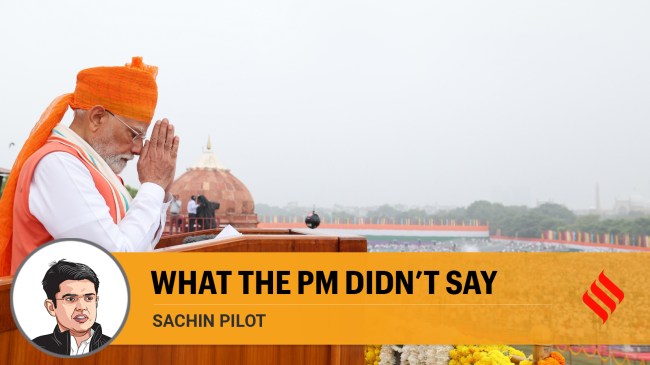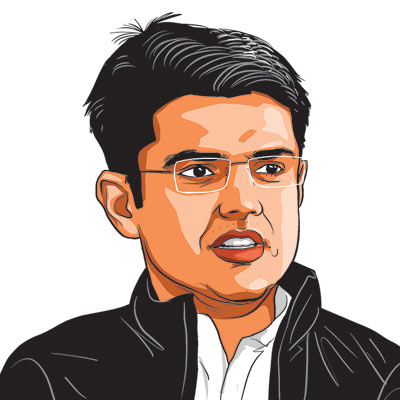Opinion Sachin Pilot writes: All that the Prime Minister didn’t say in his Independence Day speech
The PM’s speech failed to capture the spirit of ‘unity in diversity’ which had driven the freedom movement. It came across as yet another partisan address
 The Prime Minister spoke of “picchde ko praathmikta” (priority to the backward) but has allowed an environment of fear to fester where backward communities remain concerned about their existing constitutional protections and guarantees.
The Prime Minister spoke of “picchde ko praathmikta” (priority to the backward) but has allowed an environment of fear to fester where backward communities remain concerned about their existing constitutional protections and guarantees. The 79th Independence Day is a moment of great pride for every Indian. Our great nation has demonstrated how, despite tremendous socioeconomic challenges, a country as large as India can move from a democratic experiment to a model democracy. The day commemorates the unprecedented collective effort of every Indian to gain independence from colonial rule. The independence movement was not driven by a person, an ideology, or a single organisation. It encompassed the efforts of hundreds of thousands of patriots who cut across religious, caste, regional, and political lines — a unity in diversity — which till date remains our greatest strength.
However, the Prime Minister’s address on August 15 failed to underscore or reiterate this spirit, and the speech came across like another partisan address. The BJP’s attempt to discredit previous Prime Ministers and other political parties who have served the country reared its head again when the Prime Minister incorrectly referred to a lack of technological progress in previous governments. This narrative conveniently forgets the immense contributions of Jawaharlal Nehru in establishing ISRO, IIMs, IITs, AIIMS, HAL, DRDO, and Bhabha Atomic Research Centre. Indira Gandhi continued those endeavours — she facilitated the mission to send India’s first citizen to orbit in space (Squadron Leader Rakesh Sharma), ordered underground nuclear tests, and had the foresight to initiate a national mission on seabed mining. Rajiv Gandhi was instrumental in bringing about the telecom and IT revolution, making long distance communication a reality for every Indian. Manmohan Singh’s government launched the ambitious project to connect more than 2.5 lakh gram panchayats through broadband by laying optical fibre throughout the length and breadth of the country, systematically strengthening the foundation for a truly digital India. These are massive milestones in India’s technological journey; discounting and underplaying the contributions of previous leaders of the nation is a disservice to the country’s history.
The government appears to seek credit for India becoming the fourth largest economy in the world in the last few years. But there is more to this macro-economic data. What the claim misses entirely is an analysis of the “average”. From a per-person perspective, India as a country of about 140 crore people, still remains in the list of lower middle income countries with a per-capita GDP of $2,711. For comparison, the per capita GDP of Sri Lanka is $4,325, and Bhutan is $3,913. We have overtaken Japan’s GDP and are now eyeing Germany’s GDP in order to become the third largest economy. But it is important to note that both these countries have a population of approximately 12 crore and 8 crore, respectively. That is roughly the size of two states in India. Japan’s per capita GDP is about $33,767 and Germany’s is $54,343. India’s closest country in terms of population is China with a per capita GDP of $12,614. A true measure of India’s economic success must be tested on the per-person data point. It is the surest indicator to assess whether we are punching above our weight or not.
The BJP has also been incessantly trying to draw political mileage from Operation Sindoor. Today’s address by the PM was no different. Importantly, this was another instance where the issue of whether the claim by the President of the United States that he ensured a ceasefire between India and Pakistan is true, was completely ducked. The US President continues to claim credit for the ceasefire and so far, the PM has not denied Trump’s role publicly. This is a serious departure from India’s time-tested stand that resolving issues between India and Pakistan is a bilateral matter and no foreign interference shall be permitted. The other aspect of the Pahalgam terrorist attacks and Operation Sindoor that remains unanswered is accountability. The security lapse exposed a failure of the Government’s intelligence and security machinery. This failure is compounded by the lack of meaningful international support in unequivocally castigating Pakistan as a state sponsor of terrorism.
The Prime Minister spoke of “picchde ko praathmikta” (priority to the backward) but has allowed an environment of fear to fester where backward communities remain concerned about their existing constitutional protections and guarantees. This legitimate fear was reinforced during the recent Lok Sabha elections where BJP campaigned on its aim to secure 400 seats — a brute majority which might have allowed sweeping constitutional amendments. It is therefore no surprise that the people of India have reduced them to relying on a delicately strung coalition government at the centre. Despite their electoral drubbing, the BJP has systematically attacked the rights of SCs, STs, and OBCs, for example by drastically reducing their scholarships, and delaying appointments in university posts to candidates from backward communities. According to the government’s own figures, 83 per cent of professor-level posts reserved for STs, 80 per cent for OBCs, and 64 per cent for SCs are unfilled in central universities.
There is a lack of balanced regional growth in the country with several states severely lagging. The BJP government has also caused an unhealthy amount of strain in centre-state relations by creating budget allocations ridden with political biases and manipulating government levies to deny economic benefits to states. If the government truly wants to secure the rights and interests of the backward communities and regions, it must move beyond rhetoric and politics to do real work on the ground.
Independence Day is a day to revere our motherland and the generations who came before us who gave their lives to provide us this precious freedom. It is a day to recommit ourselves to the ongoing cause of nation building and remember that strengthening the country is our highest duty, our moral calling. Let us hope that the government imbibes that spirit and works towards a more united, a more developed, and a more progressive India.
The writer is the MLA from Tonk and AICC general secretary in charge of Chhattisgarh






